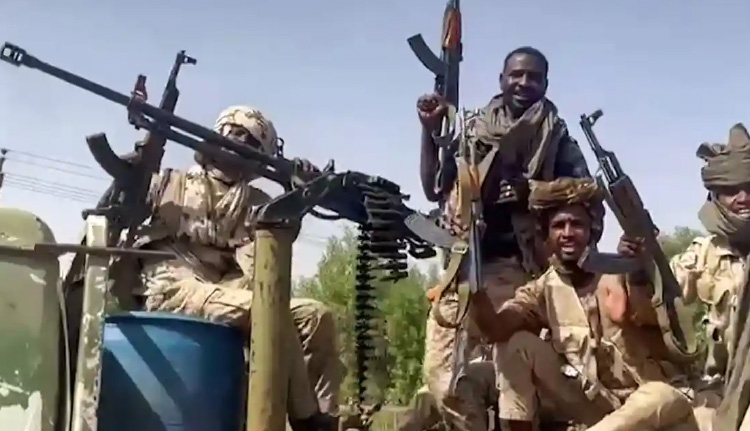Fierce fighting across Sudan has left millions of Sudanese citizens without access to necessary humanitarian aid and hardly any hopes for a peaceful transition to civilian rule. While forces loyal to two rival generals are vying for control, civilians who are still alive are enduring desperate shortages of food and basic supplies. They have to run for their lives amid power blackouts, a lack of cash, communications outages, and runaway inflation.
The clashes between the Sudanese Army and the Rapid Support Forces (RSF) erupted in mid-April resulting in the killing of hundreds and the displacement of millions of people. Different attempts to establish a ceasefire failed to curtail hostilities with growing threats that the conflict is not only turning into an all-out civil war but also raising fears about repercussions on neighboring regions and the economics and security of the rest of the world.
The precise cost of the Sudan conflict is difficult to quantify. However, it is clear that it has had a profound impact not only on the country’s development but also on regional and international geopolitics.
A Conflict with Deep Roots
Despite being one of the poorest and least developed countries in the world, Sudan has significant geopolitical importance due to its strategic location, natural resources, and historical influence on the African continent.
It lies at the crossroads of Sub-Saharan Africa and the Middle East, overlooking the Red Sea. Sudan also has a Sahelian belt with a desert in the far north, fertile land in the Nile valleys, and the Gezira region, with land used for farming and livestock across the rest of the country.
It has a wealth of valuable resources including oil, natural gas, gold, copper, and iron ore. These resources should have made Sudan an important player in the global economy, attracting foreign investment and fueling economic growth. However, race to control these resources has also led to conflicts and power struggles within the country with different ethnicities and tribes.
For most of its independent history, the country has faced substantial internal conflict that has curbed its ability to play its deserved role in the region. This includes two of the longest-lasting civil wars on the African continent. Under the terms of the Comprehensive Peace Agreement in 2005, South Sudan seceded from Sudan in 2011 and became the 54th independent state of Africa.
The Sudanese army and the RSF have been at odds with each other in recent years. The RSF, a paramilitary unit that originated from the Janjaweed militia, has been accused of committing human rights abuses and atrocities in the Darfur region of Sudan in the early 2000s. However, the RSF has gained more power and influence in Sudan under former President Omar al-Bashir, who was overthrown by a military coup in 2019.
After the overthrow of al-Bashir, Sudan’s military ruler and head of the army Abdel Fattah al-Burhan, and General Mohamed Hamdan Dagalo (widely known as Hemedti), the country’s deputy and head of the Rapid Support Forces (RSF) paramilitary group were allies. They first worked together to topple al-Bashir in 2019 and played a pivotal role in the military coup in 2021.
However, tensions arose during negotiations to integrate the RSF into the country’s military as part of plans to restore civilian rule. The situation developed into an all-out confrontation in Khartoum streets in mid-April. Despite reaching different agreements for humanitarian ceasefires, any of them succeed to stop fighting, with the two parties trading accusations about violations of ceasefires and attacks against civilian targets.
Dire Humanitarian Situation
According to United Nations’ estimates, at least one million people might flee Sudan by October. It also warned that the conflict in Sudan risks increasing people trafficking and spreading weapons across a fragile region.
More than 350,000 people have already fled across Sudan’s borders with most heading to Egypt, Chad and South Sudan, while more than 1 million have been displaced within Sudan, which has a population of 49 million.
Several UN experts expressed their fears that the collapse of law and order in Sudan when millions of people desperate to move on would provide fertile ground for human trafficking, while arms circulating across borders could engender more violence. Such fears seem to be credible taking in account that some countries bordering Sudan include South Sudan, Central African Republic, Ethiopia, and Libya; all affected by their own recent conflicts and suffer some kind of instability.
The flow of Sudanese refugees also represents an economic burden for some other countries which already suffer economic problems. Egypt, for example, received 160,000 people from Sudan since the beginning of the conflict to join a large Sudanese community of nearly 5 million who resided in Egypt even before the recent conflict.
The economic impact of this conflict is not only about the cost of humanitarian aid and refugees flow, as the impact is poised to represent another pressure on trade chains and several international markets.
Sudanese Domino Effect
As the conflict continues in Sudan, many experts expressed their fears that what happens in Sudan would not probably stay in Sudan.
Conflict in Sudan threatens the country’s fast-growing agriculture sector as well as its natural resources – including oil, gold, and gum arabic.
Fizzy drinks, candy, and cosmetics manufacturers are increasingly worried as the world’s largest producer of gum arabic, is suffering tensions that can deprive the world of 70% of the production of this essential and uncompensated raw material.
The ongoing fighting is not only leading the country to economic collapse but also could disrupt the global supply chain. Following the war in Ukraine, Sudan stood as one of the potential grain producers that can compensate for part of the Ukrainian and Russian production. However, the new conflict has nipped these potentials in the bud.
The ongoing conflict can also cover operations by some parties to drain Sudan of huge reserves of gold. The country is also rich in natural gas, silver, chromite, manganese, gypsum, mica, zinc, iron, lead, uranium, copper, kaolin, cobalt, granite, nickel, tin, and aluminum, which can offer significant economic value for world markets.
Concerns are also rising over oil production and exports in Sudan and its bigger-producing southern neighbor. Although Sudan’s production stands at only 60,000 b/d, fighting in Khartoum could disrupt 170,000 b/d coming from South Sudan which relies on Sudan to export its crude, which travels through a pipeline to the Red Sea via Khartoum.
Continued fighting will certainly lead to further regional instability, rolling back democratic gains, endangering large swathes of Africa, and imposing more pressure on the world economy.
As the two parties in Sudan have thousands of people to fight, fortunes to drain and international bakers to support, Sudan is facing a perfect storm that can push it into a prolonged conflict with no imminent end in sight.







